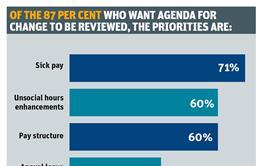This latest barometer reinforces what NHS Employers knows from its discussions with employers – reform of pay systems is high on managers and staff’s list of priorities, says Gill Bellord
We have not achieved the changes to the consultant contract we wanted in 2014. Those would have supported better ways of working, including the seven-day medical services that patients want.
HR Barometer
In a way, not achieving these has left managers paralysed in one area of workforce planning at a time when flexibility and responsiveness are most needed.
For doctors in training we had made proposals, including work schedules, that would support training while working and reduce the current maximum hours worked in any one week.Sadly, these have not found favour with the junior doctors and they have withdrawn from negotiations.
The simple fact is that the call for reform will not go away.

‘We need to see progress toward a sensible, sustainable move away from pay restraint’
NHS Employers will of course continue to work towards national contract agreements whenever they are the best path to quality care.
Last month saw an end to constructive national negotiations around hospital doctors’ contracts but employers have told us they still desire a national contract. We will be putting our proposals on both of these contracts to the Doctors’ and Dentists’ Review Body by the end of the year.
In 2015, we need to see progress toward a sensible, sustainable move away from pay restraint. We don’t know exactly what form that will take but one consideration has to be the living wage.
Moving forward
Currently a sixth of the barometer’s respondents are suggesting a pay rise only for the lowest paid. I wonder if this will increase as pressure for more tailored solutions grows. Certainly the desire to see Agenda for Change reviewed is increasing.
‘Given the lack of further resources, the focus must now be on maximising the responsive management of the workforce’
The current pay dispute is challenging for NHS organisations and continues to have an impact on patient care. We have achieved much in the NHS through partnership working and we need to return to that going forward.
Reports like this and the NHS Staff Survey show a resilience in staff morale. This is such a credit to the dedication of staff, and to the expertise and focus around supporting them. The overall picture is a need to embed great, supportive programmes everywhere. Please do keep copying each other’s best ideas and building on them.
This year has seen some back and forth on the idea of staffing ratios. It’s an idea we strongly criticise because it doesn’t accommodate the realities of flexible planning and it wouldn’t best use – or support – available staff.
Frontline numbers continue to grow, albeit slowly, and this barometer suggests they will keep growing. Given the lack of further resources, the focus must now be on maximising the responsive management of that workforce.
Gill Bellord is director of employment relations and reward at NHS Employers
Topics
Exclusive survey: HR managers back end to pay restraint

NHS staff should be awarded a pay rise in line with inflation beyond 2015-16, according to a poll of HR managers by HSJ
- 1
- 2
 Currently
reading
Currently
reading
NHS Employers: Reform of pay systems remain a priority































No comments yet